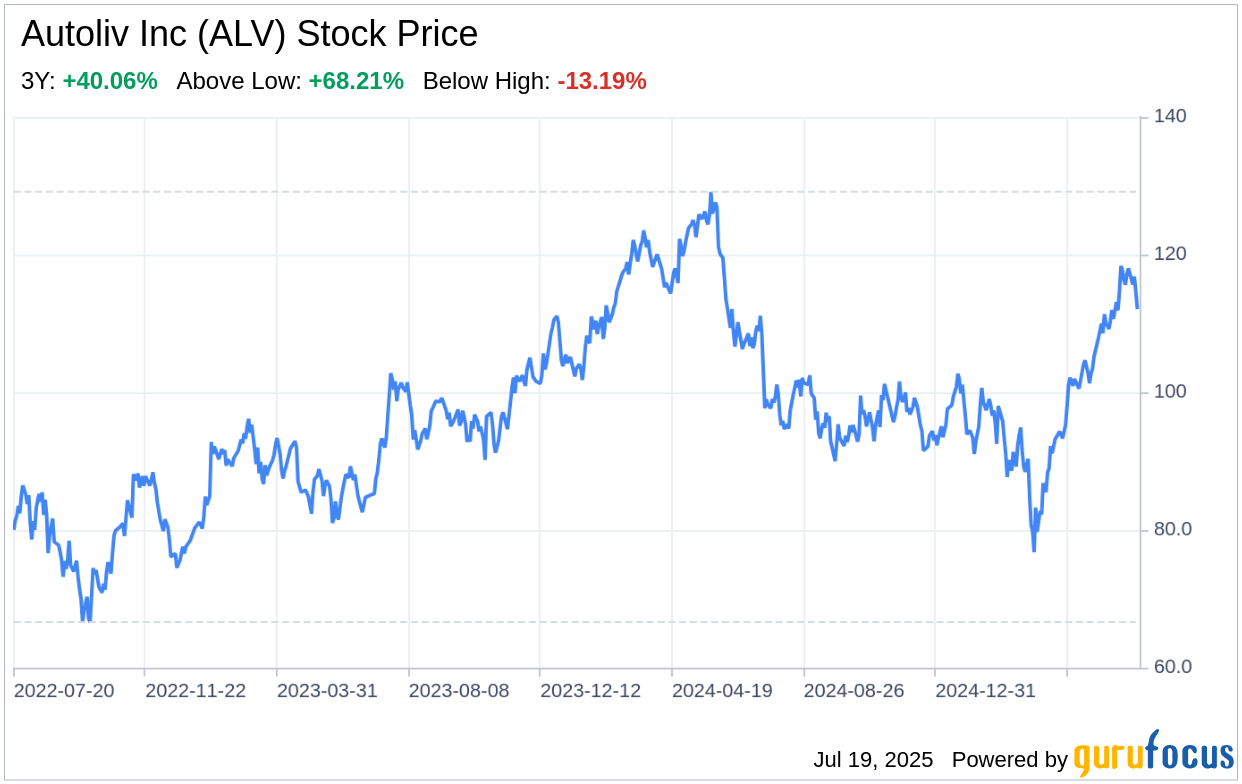Autoliv Inc (ALV, Financial), the global leader in passive safety components and systems for the automotive industry, has recently filed its 10-Q report on July 18, 2025. This SWOT analysis delves into the company's financials, revealing a solid performance with net sales rising from $2,605 million in the second quarter of 2024 to $2,714 million in the same period of 2025. Net income also saw a healthy increase from $139 million to $168 million year-over-year. With a strong balance sheet and a commitment to shareholder returns, evidenced by a substantial dividend per share increase from $0.68 to $1.55, Autoliv is poised for continued success. However, the company must navigate potential risks, including product liability and recall concerns, to maintain its competitive edge and financial health.

Strengths
Financial Robustness and Market Leadership: Autoliv Inc (ALV, Financial) has demonstrated financial strength, with a notable increase in net sales and net income in the recent quarter. The company's position as a market leader in passive safety components is underpinned by a diverse product portfolio that includes seat belts, airbags, and steering wheels. Autoliv's strong financials are a testament to its operational efficiency and ability to capitalize on its market leadership to drive growth.
Global Footprint and Diverse Customer Base: With a significant presence in the Americas, Europe, China, and other regions, Autoliv benefits from a geographically diversified revenue stream. The company's largest customers, including the Renault-Nissan-Mitsubishi alliance, Stellantis, and Volkswagen, contribute to a stable and varied customer base, reducing dependency on any single market or customer.
Commitment to Shareholder Returns: Autoliv's increased cash dividend per share, from $0.68 to $1.55, signals a strong commitment to shareholder returns. This move reflects the company's confidence in its financial stability and its strategy to enhance shareholder value over the long term.
Weaknesses
Product Liability and Recall Risks: Autoliv faces inherent risks associated with product liability and recalls, which could lead to significant financial implications and damage to its reputation. The company's involvement in civil litigation and the potential for material warranty, recall, or product liability claims pose challenges that require diligent risk management and quality control measures.
Competitive Pressures: The automotive safety systems market is highly competitive, with several players vying for market share. Autoliv must continuously innovate and maintain cost competitiveness to stay ahead, which can strain resources and impact profitability.
Exchange Rate Fluctuations: As a global company, Autoliv is exposed to currency exchange rate fluctuations, which can affect financial results. The company must manage this risk effectively to ensure that its financial performance remains stable despite the volatility in currency markets.
Opportunities
Technological Advancements: The automotive industry is rapidly evolving, with increased focus on safety and autonomous driving technologies. Autoliv can leverage its expertise to develop innovative safety solutions that cater to these emerging trends, positioning the company for future growth.
Expansion in Emerging Markets: Autoliv has the opportunity to expand its presence in emerging markets, where the demand for vehicles and, consequently, automotive safety systems is growing. By tapping into these markets, Autoliv can diversify its revenue sources further and capitalize on new growth avenues.
Strategic Partnerships and Acquisitions: Autoliv can pursue strategic partnerships and acquisitions to enhance its product offerings and technological capabilities. Collaborating with tech companies and startups can accelerate innovation and provide a competitive edge in the market.
Threats
Regulatory Changes: The automotive industry is subject to stringent regulations that can impact operations and costs. Changes in safety standards or environmental regulations could require significant investments from Autoliv to comply, affecting its financial performance.
Economic Uncertainty: Economic downturns and uncertainty can lead to reduced consumer spending on vehicles, directly impacting Autoliv's business. The company must navigate these economic cycles carefully to maintain its financial health.
Supply Chain Disruptions: Autoliv's global supply chain is vulnerable to disruptions caused by geopolitical tensions, trade disputes, or natural disasters. Ensuring supply chain resilience is crucial to prevent production delays and financial losses.
In conclusion, Autoliv Inc (ALV, Financial) exhibits a strong financial foundation and market leadership in the automotive safety systems industry. The company's global footprint and commitment to shareholder returns are commendable strengths. However, it must address weaknesses such as product liability and recall risks, and competitive pressures. Opportunities for growth through technological advancements and emerging markets are promising, while threats from regulatory changes, economic uncertainty, and supply chain disruptions require strategic vigilance. Autoliv's forward-looking strategies, including a focus on operational efficiency and cost reduction programs, position it well to leverage its strengths and opportunities while mitigating its weaknesses and threats.
This article, generated by GuruFocus, is designed to provide general insights and is not tailored financial advice. Our commentary is rooted in historical data and analyst projections, utilizing an impartial methodology, and is not intended to serve as specific investment guidance. It does not formulate a recommendation to purchase or divest any stock and does not consider individual investment objectives or financial circumstances. Our objective is to deliver long-term, fundamental data-driven analysis. Be aware that our analysis might not incorporate the most recent, price-sensitive company announcements or qualitative information. GuruFocus holds no position in the stocks mentioned herein.
